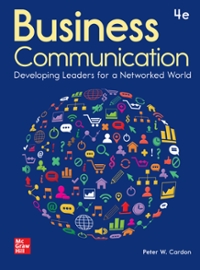Answered step by step
Verified Expert Solution
Question
1 Approved Answer
1. Make sure that you clearly identify the moral theory, theory of justice, or theory of social responsibility you use for your analysis. 4.
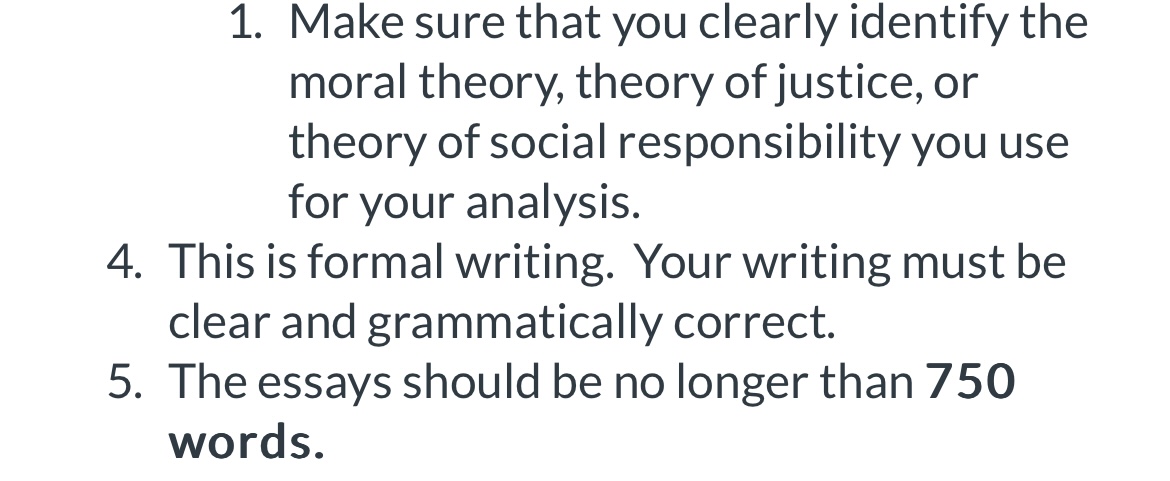
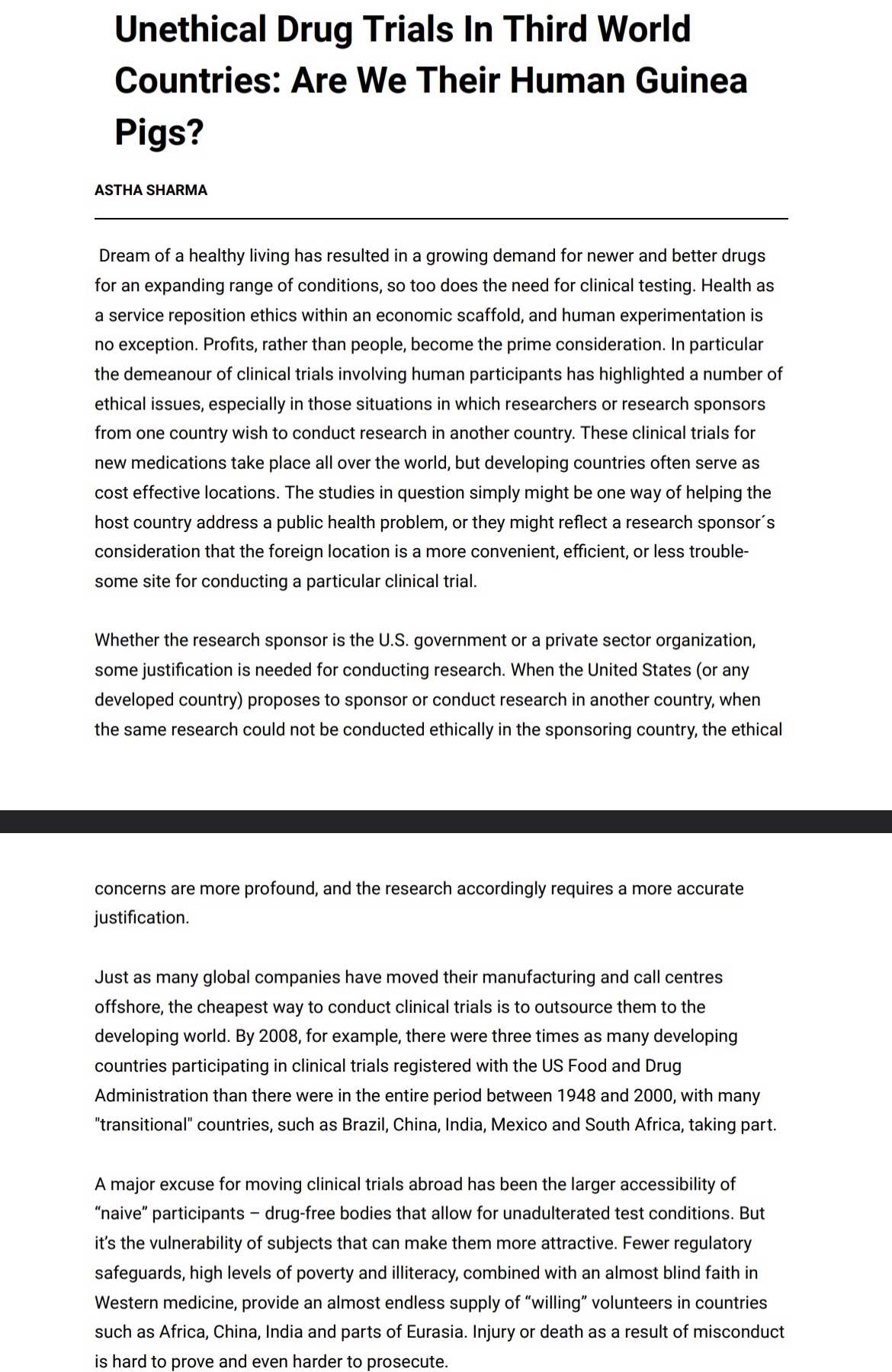
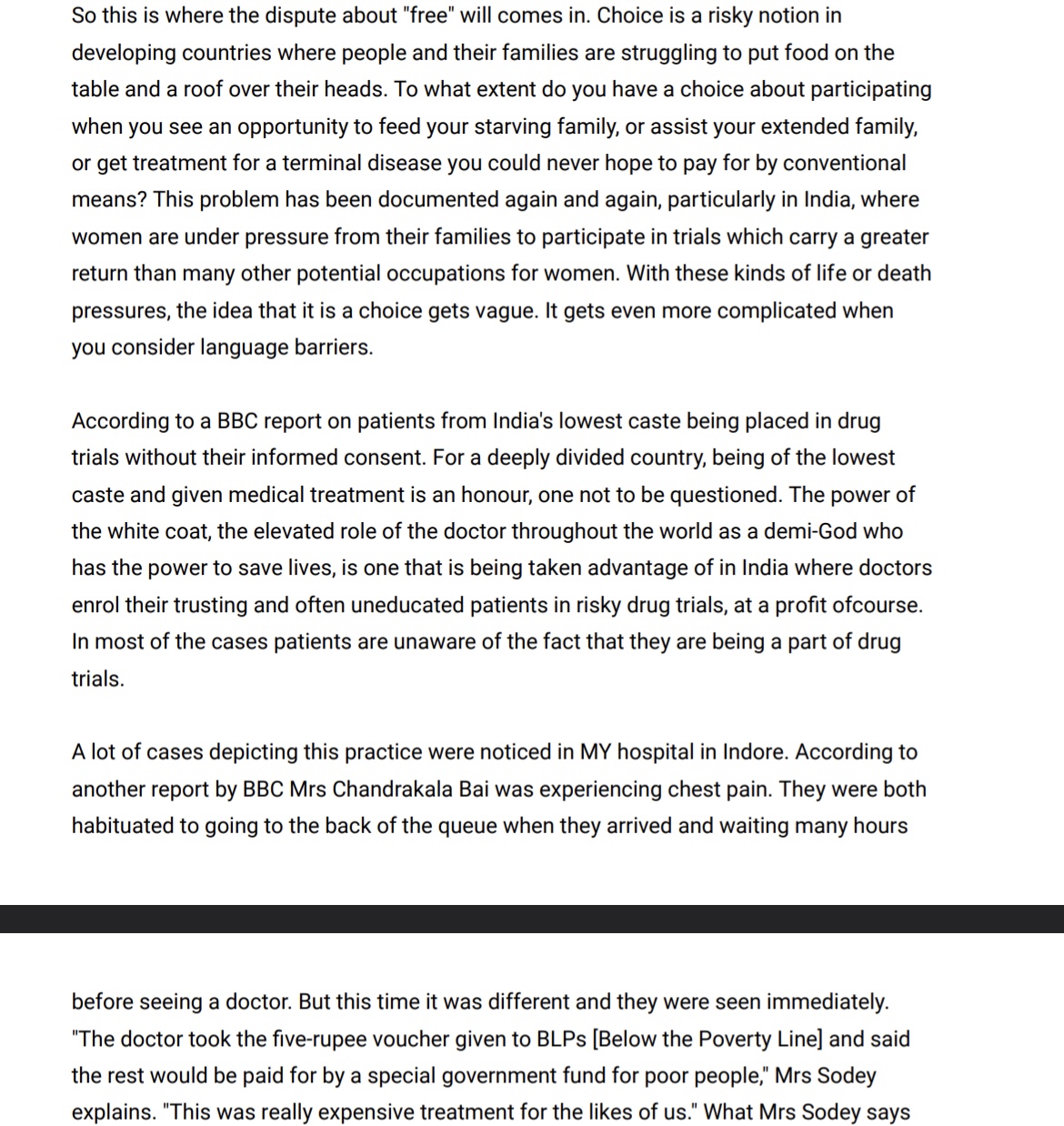
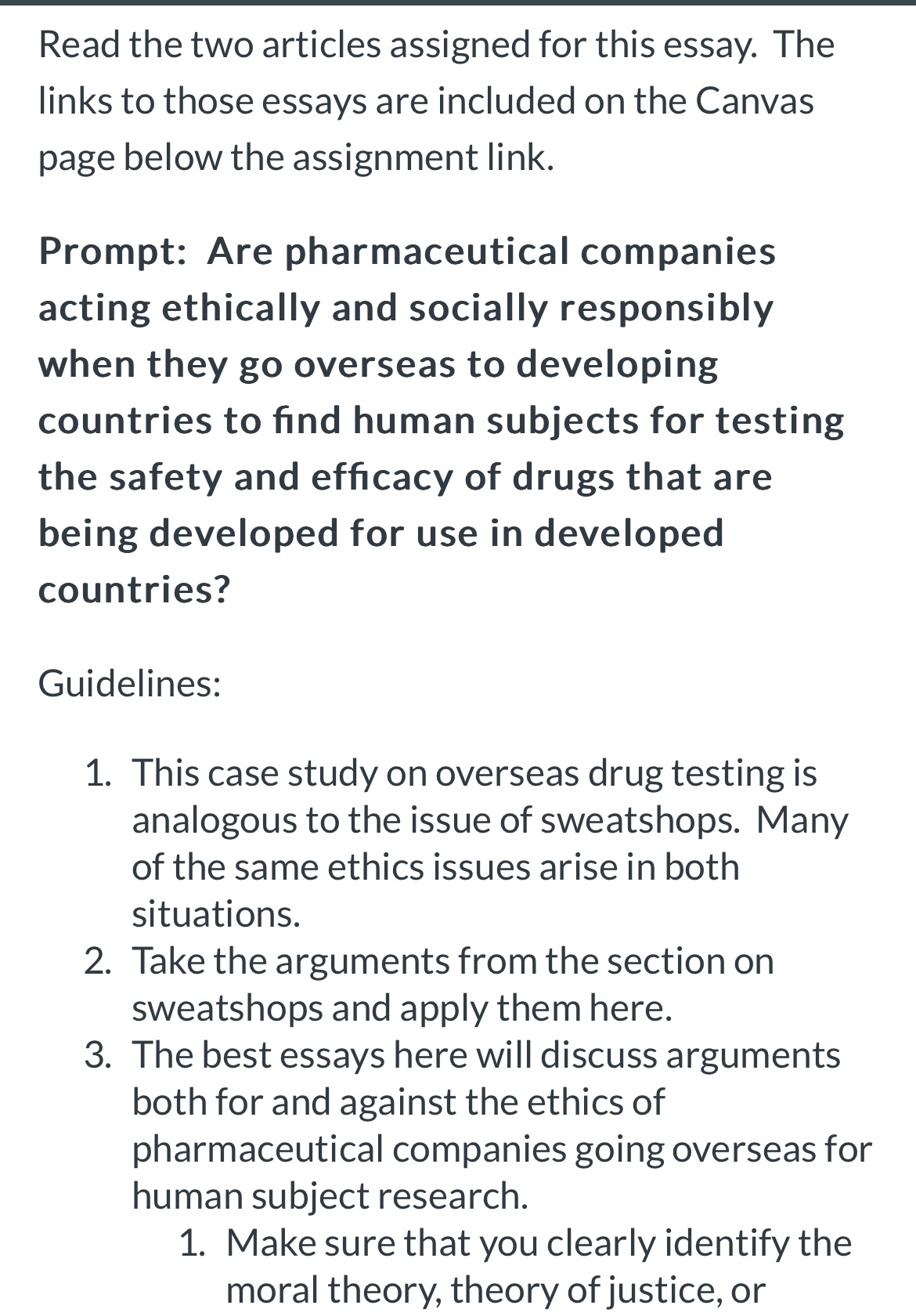
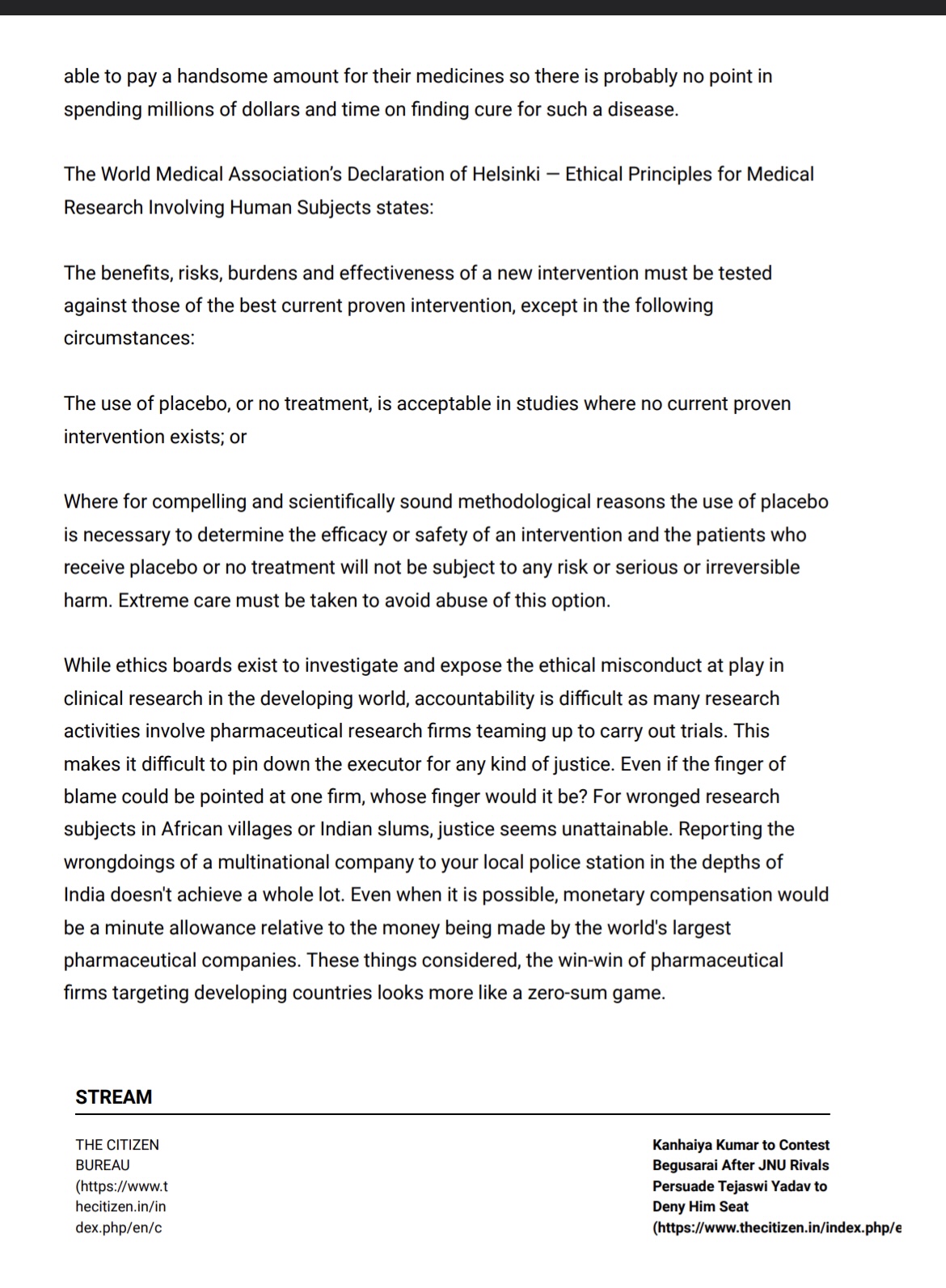
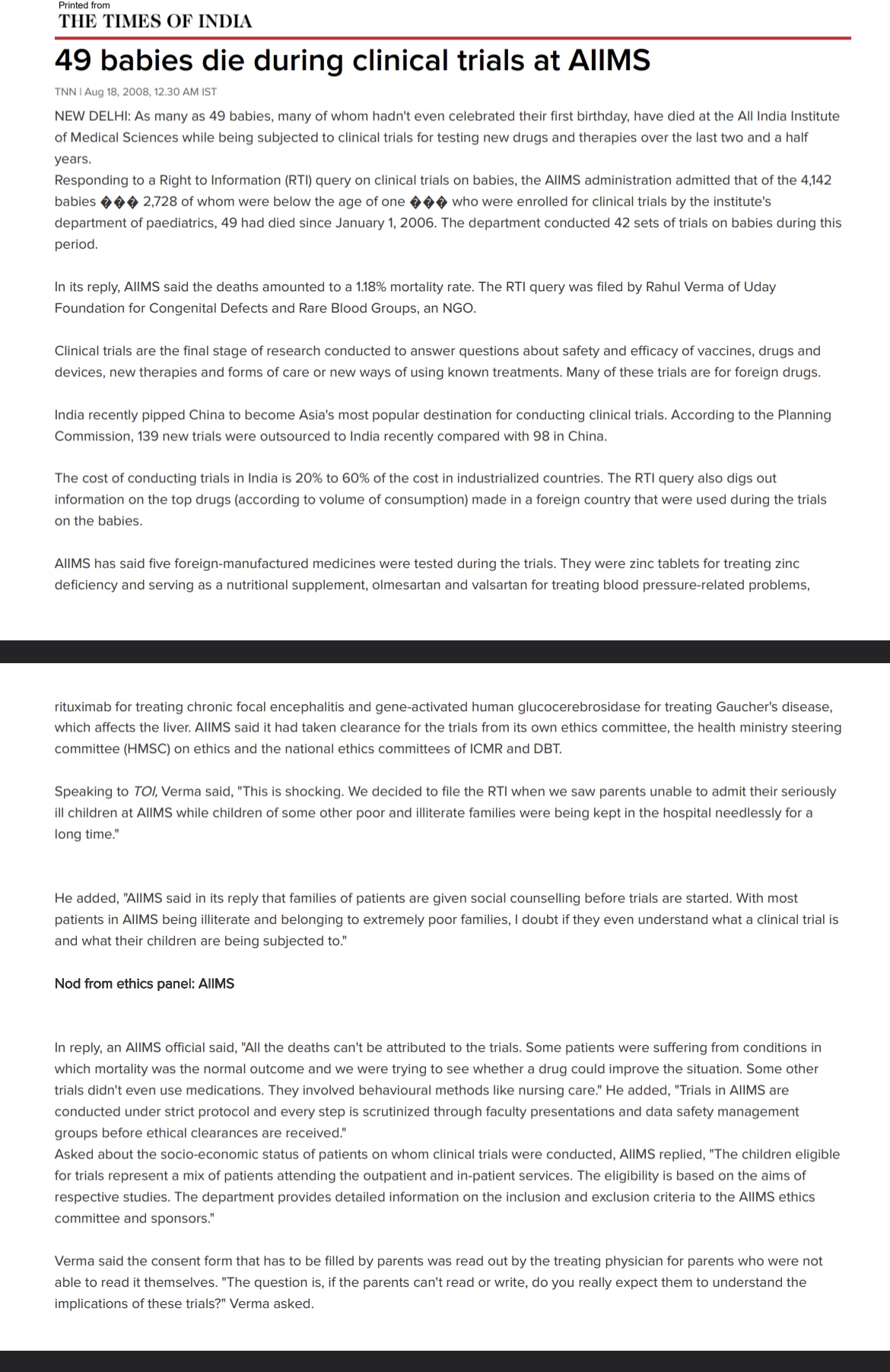
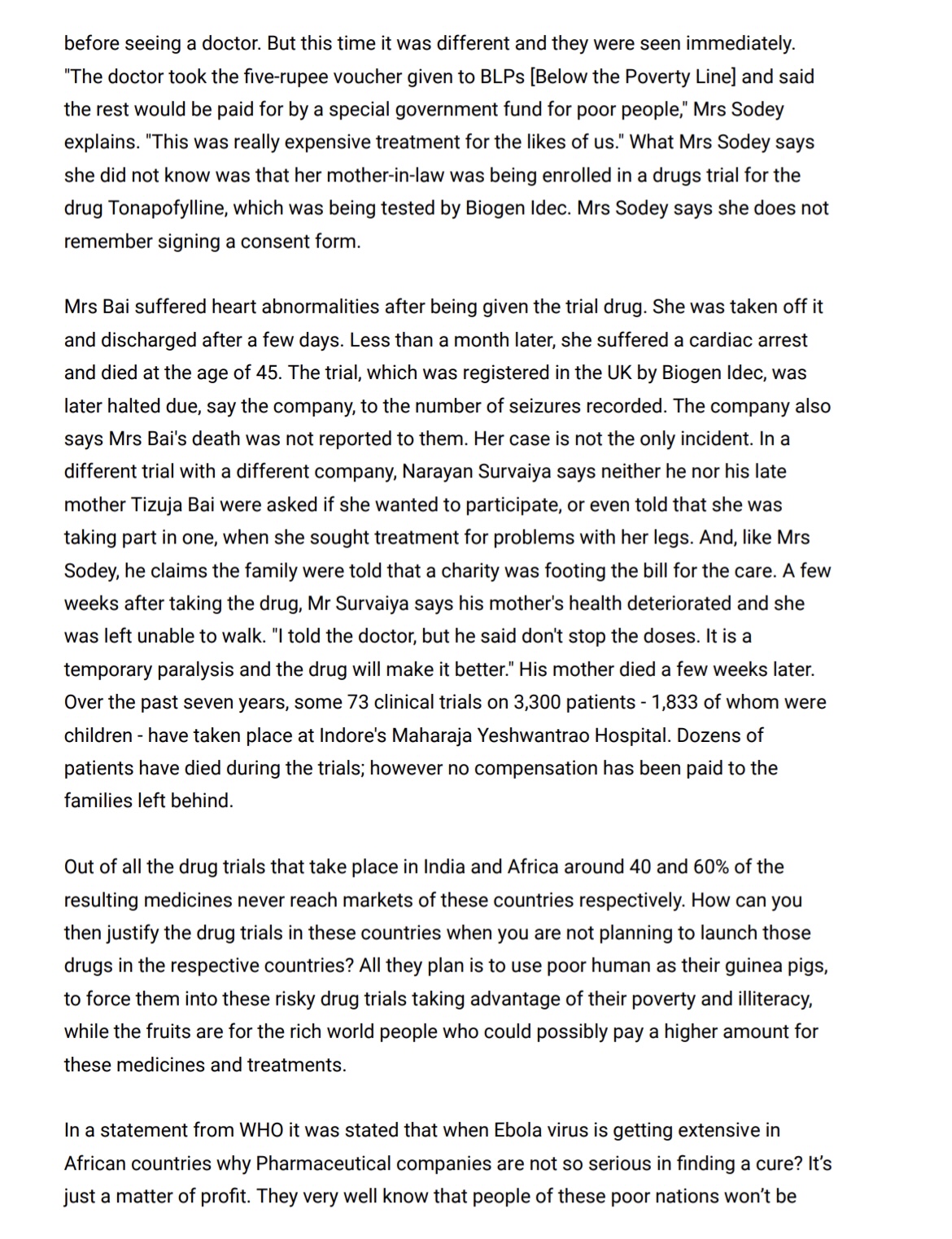
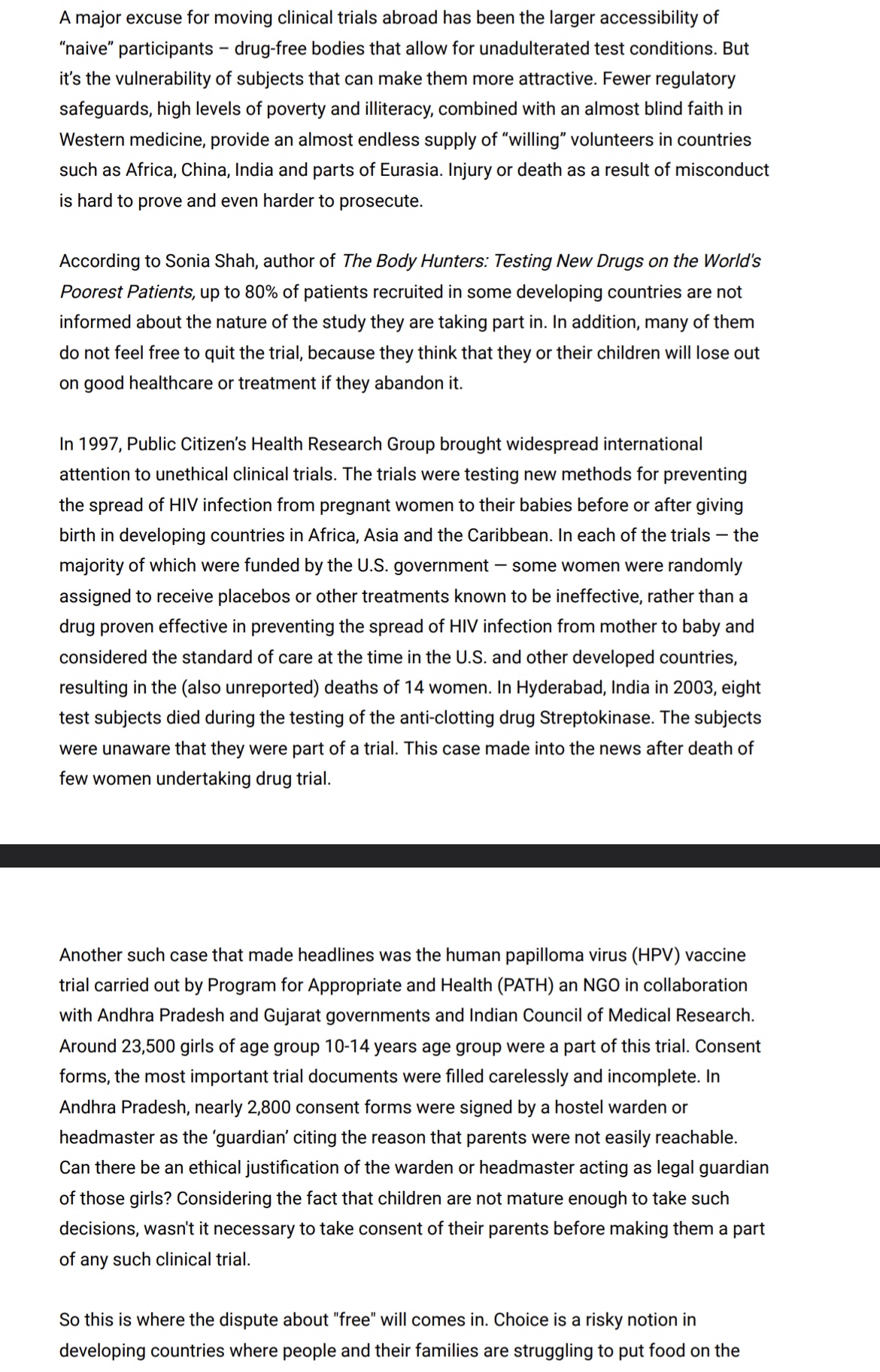
1. Make sure that you clearly identify the moral theory, theory of justice, or theory of social responsibility you use for your analysis. 4. This is formal writing. Your writing must be clear and grammatically correct. 5. The essays should be no longer than 750 words. Unethical Drug Trials In Third World Countries: Are We Their Human Guinea Pigs? ASTHA SHARMA Dream of a healthy living has resulted in a growing demand for newer and better drugs for an expanding range of conditions, so too does the need for clinical testing. Health as a service reposition ethics within an economic scaffold, and human experimentation is no exception. Profits, rather than people, become the prime consideration. In particular the demeanour of clinical trials involving human participants has highlighted a number of ethical issues, especially in those situations in which researchers or research sponsors from one country wish to conduct research in another country. These clinical trials for new medications take place all over the world, but developing countries often serve as cost effective locations. The studies in question simply might be one way of helping the host country address a public health problem, or they might reflect a research sponsor's consideration that the foreign location is a more convenient, efficient, or less trouble- some site for conducting a particular clinical trial. Whether the research sponsor is the U.S. government or a private sector organization, some justification is needed for conducting research. When the United States (or any developed country) proposes to sponsor or conduct research in another country, when the same research could not be conducted ethically in the sponsoring country, the ethical concerns are more profound, and the research accordingly requires a more accurate justification. Just as many global companies have moved their manufacturing and call centres offshore, the cheapest way to conduct clinical trials is to outsource them to the developing world. By 2008, for example, there were three times as many developing countries participating in clinical trials registered with the US Food and Drug Administration than there were in the entire period between 1948 and 2000, with many "transitional" countries, such as Brazil, China, India, Mexico and South Africa, taking part. A major excuse for moving clinical trials abroad has been the larger accessibility of "naive" participants - drug-free bodies that allow for unadulterated test conditions. But it's the vulnerability of subjects that can make them more attractive. Fewer regulatory safeguards, high levels of poverty and illiteracy, combined with an almost blind faith in Western medicine, provide an almost endless supply of "willing" volunteers in countries such as Africa, China, India and parts of Eurasia. Injury or death as a result of misconduct is hard to prove and even harder to prosecute. So this is where the dispute about "free" will comes in. Choice is a risky notion in developing countries where people and their families are struggling to put food on the table and a roof over their heads. To what extent do you have a choice about participating when you see an opportunity to feed your starving family, or assist your extended family, or get treatment for a terminal disease you could never hope to pay for by conventional means? This problem has been documented again and again, particularly in India, where women are under pressure from their families to participate in trials which carry a greater return than many other potential occupations for women. With these kinds of life or death pressures, the idea that it is a choice gets vague. It gets even more complicated when you consider language barriers. According to a BBC report on patients from India's lowest caste being placed in drug trials without their informed consent. For a deeply divided country, being of the lowest caste and given medical treatment is an honour, one not to be questioned. The power of the white coat, the elevated role of the doctor throughout the world as a demi-God who has the power to save lives, is one that is being taken advantage of in India where doctors enrol their trusting and often uneducated patients in risky drug trials, at a profit ofcourse. In most of the cases patients are unaware of the fact that they are being a part of drug trials. A lot of cases depicting this practice were noticed in MY hospital in Indore. According to another report by BBC Mrs Chandrakala Bai was experiencing chest pain. They were both habituated to going to the back of the queue when they arrived and waiting many hours before seeing a doctor. But this time it was different and they were seen immediately. "The doctor took the five-rupee voucher given to BLPs [Below the Poverty Line] and said the rest would be paid for by a special government fund for poor people," Mrs Sodey explains. "This was really expensive treatment for the likes of us." What Mrs Sodey says Read the two articles assigned for this essay. The links to those essays are included on the Canvas page below the assignment link. Prompt: Are pharmaceutical companies acting ethically and socially responsibly when they go overseas to developing countries to find human subjects for testing the safety and efficacy of drugs that are being developed for use in developed countries? Guidelines: 1. This case study on overseas drug testing is analogous to the issue of sweatshops. Many of the same ethics issues arise in both situations. 2. Take the arguments from the section on sweatshops and apply them here. 3. The best essays here will discuss arguments both for and against the ethics of pharmaceutical companies going overseas for human subject research. 1. Make sure that you clearly identify the moral theory, theory of justice, or able to pay a handsome amount for their medicines so there is probably no point in spending millions of dollars and time on finding cure for such a disease. The World Medical Association's Declaration of Helsinki - Ethical Principles for Medical Research Involving Human Subjects states: The benefits, risks, burdens and effectiveness of a new intervention must be tested against those of the best current proven intervention, except in the following circumstances: The use of placebo, or no treatment, is acceptable in studies where no current proven intervention exists; or Where for compelling and scientifically sound methodological reasons the use of placebo is necessary to determine the efficacy or safety of an intervention and the patients who receive placebo or no treatment will not be subject to any risk or serious or irreversible harm. Extreme care must be taken to avoid abuse of this option. While ethics boards exist to investigate and expose the ethical misconduct at play in clinical research in the developing world, accountability is difficult as many research activities involve pharmaceutical research firms teaming up to carry out trials. This makes it difficult to pin down the executor for any kind of justice. Even if the finger of blame could be pointed at one firm, whose finger would it be? For wronged research subjects in African villages or Indian slums, justice seems unattainable. Reporting the wrongdoings of a multinational company to your local police station in the depths of India doesn't achieve a whole lot. Even when it is possible, monetary compensation would be a minute allowance relative to the money being made by the world's largest pharmaceutical companies. These things considered, the win-win of pharmaceutical firms targeting developing countries looks more like a zero-sum game. STREAM THE CITIZEN BUREAU (https://www.t hecitizen.in/in dex.php/en/c Kanhaiya Kumar to Contest Begusarai After JNU Rivals Persuade Tejaswi Yadav to Deny Him Seat (https://www.thecitizen.in/index.php/e Printed from THE TIMES OF INDIA 49 babies die during clinical trials at AIIMS TNN I Aug 18, 2008, 12.30 AM IST NEW DELHI: As many as 49 babies, many of whom hadn't even celebrated their first birthday, have died at the All India Institute of Medical Sciences while being subjected to clinical trials for testing new drugs and therapies over the last two and a half years. Responding to a Right to Information (RTI) query on clinical trials on babies, the AIIMS administration admitted that of the 4,142 babies 2,728 of whom were below the age of one who were enrolled for clinical trials by the institute's department of paediatrics, 49 had died since January 1, 2006. The department conducted 42 sets of trials on babies during this period. In its reply, AIIMS said the deaths amounted to a 1.18% mortality rate. The RTI query was filed by Rahul Verma of Uday Foundation for Congenital Defects and Rare Blood Groups, an NGO. Clinical trials are the final stage of research conducted to answer questions about safety and efficacy of vaccines, drugs and devices, new therapies and forms of care or new ways of using known treatments. Many of these trials are for foreign drugs. India recently pipped China to become Asia's most popular destination for conducting clinical trials. According to the Planning Commission, 139 new trials were outsourced to India recently compared with 98 in China. The cost of conducting trials in India is 20% to 60% of the cost in industrialized countries. The RTI query also digs out information on the top drugs (according to volume of consumption) made in a foreign country that were used during the trials on the babies. AIIMS has said five foreign-manufactured medicines were tested during the trials. They were zinc tablets for treating zinc deficiency and serving as a nutritional supplement, olmesartan and valsartan for treating blood pressure-related problems, rituximab for treating chronic focal encephalitis and gene-activated human glucocerebrosidase for treating Gaucher's disease, which affects the liver. AIIMS said it had taken clearance for the trials from its own ethics committee, the health ministry steering committee (HMSC) on ethics and the national ethics committees of ICMR and DBT. Speaking to TOI, Verma said, "This is shocking. We decided to file the RTI when we saw parents unable to admit their seriously ill children at AIIMS while children of some other poor and illiterate families were being kept in the hospital needlessly for a long time." He added, "AIIMS said in its reply that families of patients are given social counselling before trials are started. With most patients in AIIMS being illiterate and belonging to extremely poor families, I doubt if they even understand what a clinical trial is and what their children are being subjected to." Nod from ethics panel: AIIMS In reply, an AIIMS official said, "All the deaths can't be attributed to the trials. Some patients were suffering from conditions in which mortality was the normal outcome and we were trying to see whether a drug could improve the situation. Some other trials didn't even use medications. They involved behavioural methods like nursing care." He added, "Trials in AIIMS are conducted under strict protocol and every step is scrutinized through faculty presentations and data safety management groups before ethical clearances are received." Asked about the socio-economic status of patients on whom clinical trials were conducted, AIIMS replied, "The children eligible for trials represent a mix of patients attending the outpatient and in-patient services. The eligibility is based on the aims of respective studies. The department provides detailed information on the inclusion and exclusion criteria to the AIIMS ethics committee and sponsors." Verma said the consent form that has to be filled by parents was read out by the treating physician for parents who were not able to read it themselves. "The question is, if the parents can't read or write, do you really expect them to understand the implications of these trials?" Verma asked. before seeing a doctor. But this time it was different and they were seen immediately. "The doctor took the five-rupee voucher given to BLPs [Below the Poverty Line] and said the rest would be paid for by a special government fund for poor people," Mrs Sodey explains. "This was really expensive treatment for the likes of us." What Mrs Sodey says she did not know was that her mother-in-law was being enrolled in a drugs trial for the drug Tonapofylline, which was being tested by Biogen Idec. Mrs Sodey says she does not remember signing a consent form. Mrs Bai suffered heart abnormalities after being given the trial drug. She was taken off it and discharged after a few days. Less than a month later, she suffered a cardiac arrest and died at the age of 45. The trial, which was registered in the UK by Biogen Idec, was later halted due, say the company, to the number of seizures recorded. The company also says Mrs Bai's death was not reported to them. Her case is not the only incident. In a different trial with a different company, Narayan Survaiya says neither he nor his late mother Tizuja Bai were asked if she wanted to participate, or even told that she was taking part in one, when she sought treatment for problems with her legs. And, like Mrs Sodey, he claims the family were told that a charity was footing the bill for the care. A few weeks after taking the drug, Mr Survaiya says his mother's health deteriorated and she was left unable to walk. "I told the doctor, but he said don't stop the doses. It is a temporary paralysis and the drug will make it better." His mother died a few weeks later. Over the past seven years, some 73 clinical trials on 3,300 patients - 1,833 of whom were children - have taken place at Indore's Maharaja Yeshwantrao Hospital. Dozens of patients have died during the trials; however no compensation has been paid to the families left behind. Out of all the drug trials that take place in India and Africa around 40 and 60% of the resulting medicines never reach markets of these countries respectively. How can you then justify the drug trials in these countries when you are not planning to launch those drugs in the respective countries? All they plan is to use poor human as their guinea pigs, to force them into these risky drug trials taking advantage of their poverty and illiteracy, while the fruits are for the rich world people who could possibly pay a higher amount for these medicines and treatments. In a statement from WHO it was stated that when Ebola virus is getting extensive in African countries why Pharmaceutical companies are not so serious in finding a cure? It's just a matter of profit. They very well know that people of these poor nations won't be A major excuse for moving clinical trials abroad has been the larger accessibility of "naive" participants - drug-free bodies that allow for unadulterated test conditions. But it's the vulnerability of subjects that can make them more attractive. Fewer regulatory safeguards, high levels of poverty and illiteracy, combined with an almost blind faith in Western medicine, provide an almost endless supply of "willing" volunteers in countries such as Africa, China, India and parts of Eurasia. Injury or death as a result of misconduct is hard to prove and even harder to prosecute. According to Sonia Shah, author of The Body Hunters: Testing New Drugs on the World's Poorest Patients, up to 80% of patients recruited in some developing countries are not informed about the nature of the study they are taking part in. In addition, many of them do not feel free to quit the trial, because they think that they or their children will lose out on good healthcare or treatment if they abandon it. In 1997, Public Citizen's Health Research Group brought widespread international attention to unethical clinical trials. The trials were testing new methods for preventing the spread of HIV infection from pregnant women to their babies before or after giving birth in developing countries in Africa, Asia and the Caribbean. In each of the trials the majority of which were funded by the U.S. government - some women were randomly assigned to receive placebos or other treatments known to be ineffective, rather than a drug proven effective in preventing the spread of HIV infection from mother to baby and considered the standard of care at the time in the U.S. and other developed countries, resulting in the (also unreported) deaths of 14 women. In Hyderabad, India in 2003, eight test subjects died during the testing of the anti-clotting drug Streptokinase. The subjects were unaware that they were part of a trial. This case made into the news after death of few women undertaking drug trial. Another such case that made headlines was the human papilloma virus (HPV) vaccine trial carried out by Program for Appropriate and Health (PATH) an NGO in collaboration with Andhra Pradesh and Gujarat governments and Indian Council of Medical Research. Around 23,500 girls of age group 10-14 years age group were a part of this trial. Consent forms, the most important trial documents were filled carelessly and incomplete. In Andhra Pradesh, nearly 2,800 consent forms were signed by a hostel warden or headmaster as the 'guardian' citing the reason that parents were not easily reachable. Can there be an ethical justification of the warden or headmaster acting as legal guardian of those girls? Considering the fact that children are not mature enough to take such decisions, wasn't it necessary to take consent of their parents before making them a part of any such clinical trial. So this is where the dispute about "free" will comes in. Choice is a risky notion in developing countries where people and their families are struggling to put food on the
Step by Step Solution
There are 3 Steps involved in it
Step: 1
Moral Theory and Analysis In analyzing ethical dilemmas the deontological moral theory specifically Kantian ethics provides a robust framework for eva...
Get Instant Access to Expert-Tailored Solutions
See step-by-step solutions with expert insights and AI powered tools for academic success
Step: 2

Step: 3

Ace Your Homework with AI
Get the answers you need in no time with our AI-driven, step-by-step assistance
Get Started


